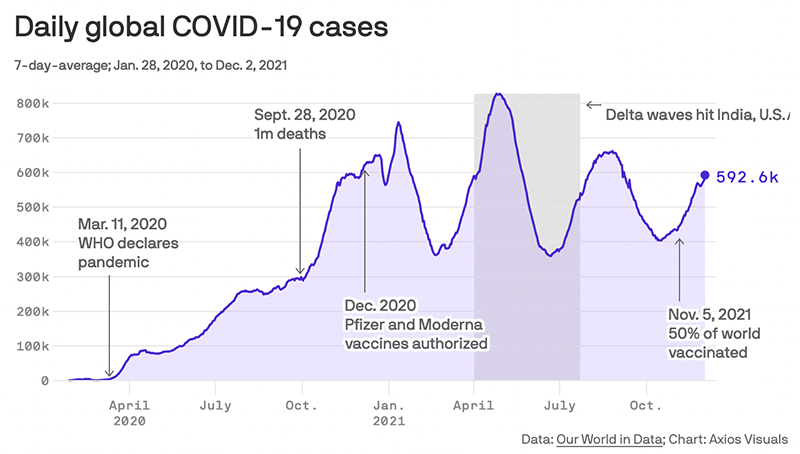Two years ago was the first known case of Covid-19 in a human being. That makes this week a very unhappy anniversary, one that we’re likely to “celebrate” for quite a few more years before this pandemic is finally history.

Looking back at the 5+ million lives lost so far, despite those losses and despite the historically fast rollout of vaccines, the overall trend of cases is upward, with each trough between spikes higher than the one before.
I’m generally an optimist, but two years into this pandemic and I’m no longer expecting a quick end. I was hopeful in June, when it looked like vaccines and masks would get us there, but then along came the Delta wave to end that hope. Now the early Omicron numbers look worse.
Meanwhile, the populace is tired of lockdowns and other mitigations and there are too many uneducated and ill-informed people who just are not helping end this pandemic.
Given that, how will this finally end? I answered that question back in March 2020 on Quora:
Epidemics end in one of these ways:
1- Everyone who can get infected gets infected (see Black Death in Medieval Europe, Smallpox in Age of Exploration Americas, Spanish Flu in 1918–1920)
2- Government action finds everyone who is sick, quarantines them, and prevents further spreading (see Wuhan China, 2020, SARS in China In 2002, Ebola in West Africa, 2018)
3- Transmission slows in warm/dry weather (see influenza, every year)
4- Vaccine and/or treatment. It is possible a vaccine or treatment is found before everyone is infected. This doesn’t look likely given how long medical trials typically take, but these are not typical times.
Two years later, none of these paths have led to an end and it seems none of these will. Instead, we’re likely headed toward option 5, the path that ended the 1918 flu pandemic. Or at least ended the lockdowns, as that disease still kills at least tens of thousands of people each year in what we now call the “flu season.”
Specifically, for influenza, there was a reprise each summer followed by a new variation each autumn. In 1919, the new variation was far more deadly, killing tens of millions of healthy adults, often in days of the the first symptoms arising. That could very well happen in Covid-19 too. Luckily it has not done that so far. But then in 1920 the influenza variant of the year was a lot milder, killing far fewer people, at similar levels to what we live with today.
The news this week says Omicron might be a cross between Covid-19 and a coronavirus that cause the common cold. If that is correct, or if that happens with the Pi, Rho, Sigma, or Omega variations to come, then we’ll see ending #5:
5- The virus mutates to be more infection but far less deadly, we all learn to accept those losses, and life returns to normal.
Let us hope that comes true before the 3rd Anniversary of this horrible disease.














